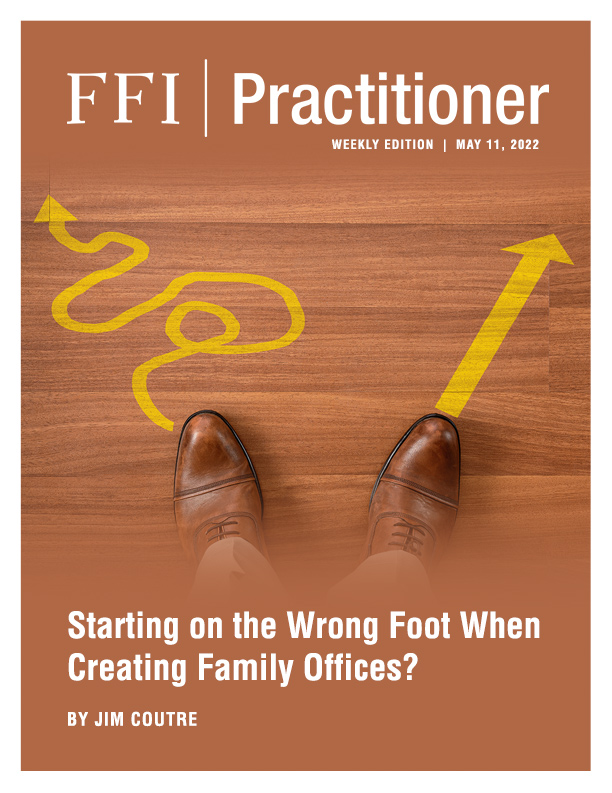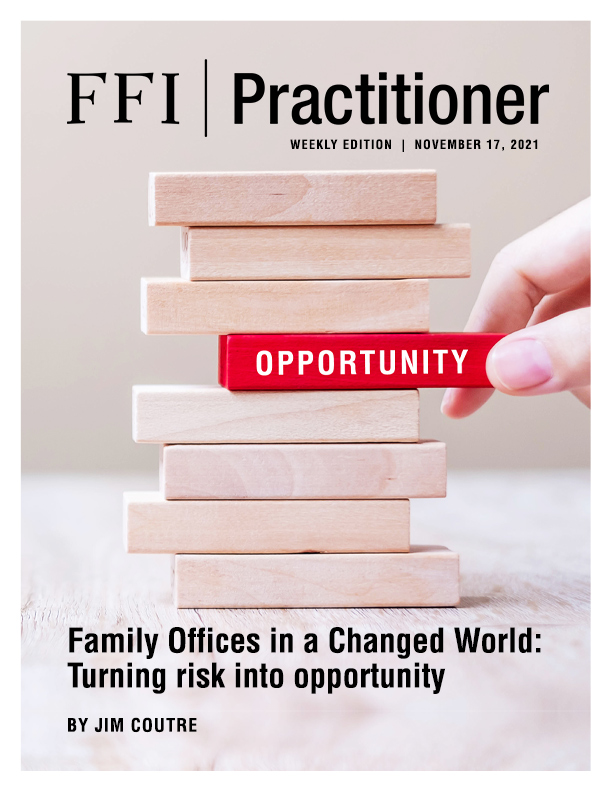
Too few.
That doesn’t make single family offices wrong or broken, but it does illuminate a lost opportunity and can drive us, as professionals entrusted by enterprising families, to imagine a new generation of family offices rather than continue to mint replicas of the same underperforming models.
Where to start? Let’s go back to the beginning and take a critical look at their origins. And let’s take that look through a lens that assumes they are flawed from the start, so that we are forced to confront constraints and biases and, ideally, feel compelled to innovate.
- Tangible needs, such as investment or tax management, are typically the pain points that drive a family to create an office.
- Many families encounter tangible needs long before they recognize their intangible needs, such as defining shared family goals or the purpose of their wealth.
- Families tend to focus and make progress on the things for which they are held accountable. Tax returns need to be filed, but finding joy doesn’t have a due date.
- Professionals who have never started an office gather insight from peers who look, sound, and think like they do.
- Professionals without experience in starting an office typically come from a risk-averse professional field and will understandably want to stay within the standard deviation of the peer offices they have talked with.
- Professionals with previous experience in starting family offices will naturally use the same process and thinking they have used before—and which they sold to the family to get the job.
- Professionals naturally lean on their expertise, viewing priorities and decision-making through the lens of what they know best and what they assume the family wants, as they were hired for their expertise.
- Families, not being experts in family offices, naturally defer direction of the office to the professionals they hire.
- Families mostly hire technical professionals and rarely hire professionals with deep understanding of family systems or who are dedicated to family thriving. Thus, the maintenance of financial wealth dominates the discourse and culture.
- Tangible needs, such as investment or tax management, are typically the pain points that drive a family to create an office.
- Many families encounter tangible needs long before they recognize their intangible needs, such as defining shared family goals or the purpose of their wealth.
- Families tend to focus and make progress on the things for which they are held accountable. Tax returns need to be filed, but finding joy doesn’t have a due date.
- Professionals who have never started an office gather insight from peers who look, sound, and think like they do.
- Professionals without experience in starting an office typically come from a risk-averse professional field and will understandably want to stay within the standard deviation of the peer offices they have talked with.
- Professionals with previous experience in starting family offices will naturally use the same process and thinking they have used before—and which they sold to the family to get the job.
- Professionals naturally lean on their expertise, viewing priorities and decision-making through the lens of what they know best and what they assume the family wants, as they were hired for their expertise.
- Families, not being experts in family offices, naturally defer direction of the office to the professionals they hire.
- Families mostly hire technical professionals and rarely hire professionals with deep understanding of family systems or who are dedicated to family thriving. Thus, the maintenance of financial wealth dominates the discourse and culture.
Sidebar
by Jim Coutre
This week’s contributor, Jim Coutre explores the impact of the pandemic and other recent economic and social unrest on family offices and highlights several opportunities to strengthen family offices in the post-pandemic world.
- Family offices are built around a conflicted relationship with financial capital; it is seen both as the priority to protect AND as the thing that family members must be protected from.
- Family offices are most often approached as a cost center rather than as an investment in a family or an individual.
- Family offices are structured around generational hierarchy, in which the few at the top make decisions for the many at the bottom.
- The ghost of Carnegie still looms large: the plan to make money at any cost and then give it away remains prominent.
- Families often relinquish the deep thinking around what the family wants or what is best for the family to professionals who don’t know them.
- Professionals who create offices to serve multiple family members rarely know those family members and don’t know if it is healthy for the family members to stay connected through an office.
- Professionals tend to start building in “doer mode” rather than “strategic-thinker mode.”
- Professionals are held accountable for specific, measurable metrics and will focus on them, even at the expense of more important, less measurable outcomes.
- Very few family members come to the table with familiarity of diverse family office models and possibilities.
- Family members starting offices often consult peer families for guidance, which creates a small, idiosyncratic data set of what offices are or can be.
- Decisions around keeping family members connected are rarely co-created by those family members.
- Family offices are built around a conflicted relationship with financial capital; it is seen both as the priority to protect AND as the thing that family members must be protected from.
- Family offices are most often approached as a cost center rather than as an investment in a family or an individual.
- Family offices are structured around generational hierarchy, in which the few at the top make decisions for the many at the bottom.
- The ghost of Carnegie still looms large: the plan to make money at any cost and then give it away remains prominent.
- Families often relinquish the deep thinking around what the family wants or what is best for the family to professionals who don’t know them.
- Professionals who create offices to serve multiple family members rarely know those family members and don’t know if it is healthy for the family members to stay connected through an office.
- Professionals tend to start building in “doer mode” rather than “strategic-thinker mode.”
- Professionals are held accountable for specific, measurable metrics and will focus on them, even at the expense of more important, less measurable outcomes.
- Very few family members come to the table with familiarity of diverse family office models and possibilities.
- Family members starting offices often consult peer families for guidance, which creates a small, idiosyncratic data set of what offices are or can be.
- Decisions around keeping family members connected are rarely co-created by those family members.






